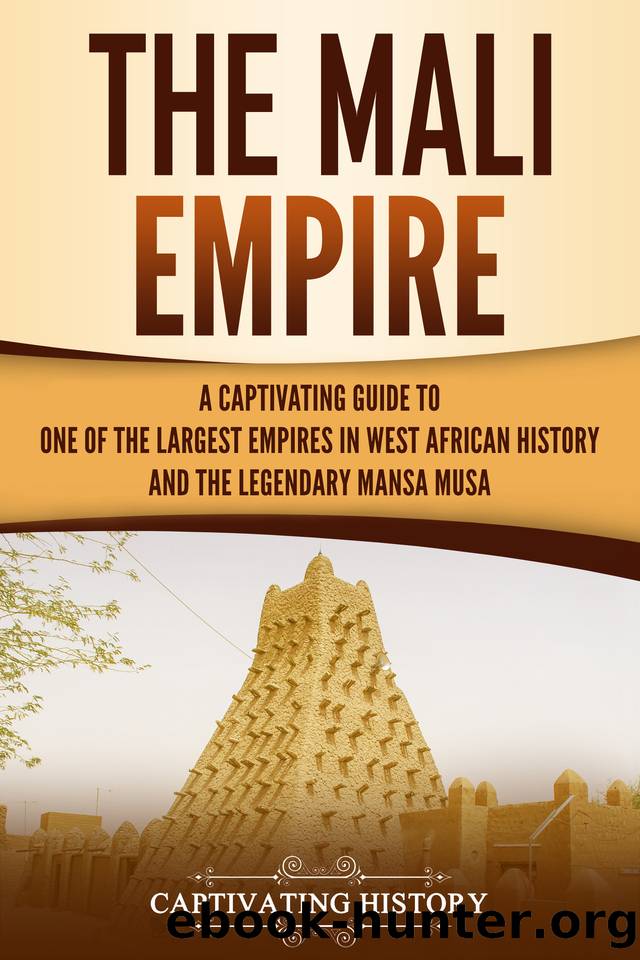The Mali Empire: A Captivating Guide to One of the Largest Empires in West African History and the Legendary Mansa Musa (Western Africa) by Captivating History

Author:Captivating History [History, Captivating]
Language: eng
Format: epub
Published: 2022-04-15T00:00:00+00:00
A modern artistic interpretation of Mansa Musa, with Malian cavalry behind him.
Credit: HistoryNmoor, CC BY-SA 4.0 <https://creativecommons.org/licenses/by-sa/4.0>, via Wikimedia Commons; https://commons.wikimedia.org/wiki/File:Empire_mansa_musa.jpeg
Another reason was to secure new trading connections, gain a larger share and more command over the trans-Saharan trade, and possibly expand Maliâs territorial claim. This is evident since at least part of his retinue were merchants. Additional confirmation comes from global history, as Islamic states of northwestern Africa were in decline at the time, making them much less profitable partners. Thus, Malian traders needed to establish new ties with the more stable and prosperous Mamluk Egypt. Finally, Mansa Musa certainly wanted to raise both his personal status and that of his empire on a global scale, which is why he would have spent more gold than was probably imaginable in the medieval Mediterranean.
It seems he managed to attain a number of his goals. There were no recorded upheavals during Musaâs reign, and his son did succeed him. During his rule, Mali enjoyed unprecedented prosperity, and it was frequently visited by numerous Arab merchants. However, Musaâs final goal was only partially achieved. Mali was recognized as a wealthy land; it was even known in European courts. Yet, his empire never managed to truly become an international power.
Apart from riches and significant global acknowledgment, Mansa Musaâs reign proved to be the golden age of the Mali Empire because of cultural advancements. His pilgrimage created greater ties with the Arab sphere. That led to the import of various aspects of Arab culture, from more mundane things like clothing to the more significant things like architecture. Reportedly, Musa even brought a famed Arab architect and poet, Abu Ishaq al-Sahili, back to Mali with him to help in his attempt to uplift the Malian culture. Though modern scholars doubt the scope of al-Sahiliâs actual contribution, he was traditionally linked with expanding Musaâs court in Niani and building several mosques, including the famous and still standing Djinguereber Mosque in Timbuktu. Regardless of his actual architectural achievements, al-Sahili certainly helped transfer some knowledge and cultural influences from the Arab world, which was undoubtedly helped by numerous other less famous visitors.
While the architectural expansion under Musa was notable and well-remembered, his mark on Malian society went beyond that. He helped develop the Sankoré Mosque in Timbuktu into a fully-fledged madrasa (an Islamic school or university). It became a center of education, with a library that supposedly had the largest book collection in Africa since the Library of Alexandria. Other madrasas were set up in cities like Djenné and Ségou. The influx of various Arab scholars and teachers, along with a number of mosques being built across the empire, helped to further the Islamization of the empire, which was supported by Musa. However, he never forced the religion on his subjects. Another consequence of the spread of Islam was the gradual penetration of Islamic law into Maliâs court and life, though it didnât completely replace the traditional rules set up by Sundiata. All of these civilizational trends gained traction after Mansa Musa returned from his hajj in late 1325 or early 1326.
Download
This site does not store any files on its server. We only index and link to content provided by other sites. Please contact the content providers to delete copyright contents if any and email us, we'll remove relevant links or contents immediately.
| Administration | Assessment |
| Educational Psychology | Experimental Methods |
| History | Language Experience Approach |
| Philosophy & Social Aspects | Reform & Policy |
| Research |
The Art of Coaching Workbook by Elena Aguilar(51199)
Trainspotting by Irvine Welsh(21666)
Twilight of the Idols With the Antichrist and Ecce Homo by Friedrich Nietzsche(18633)
Fangirl by Rainbow Rowell(9251)
Periodization Training for Sports by Tudor Bompa(8273)
Change Your Questions, Change Your Life by Marilee Adams(7782)
This Is How You Lose Her by Junot Diaz(6887)
Asking the Right Questions: A Guide to Critical Thinking by M. Neil Browne & Stuart M. Keeley(5775)
Grit by Angela Duckworth(5615)
Red Sparrow by Jason Matthews(5473)
Paper Towns by Green John(5191)
Room 212 by Kate Stewart(5121)
Ken Follett - World without end by Ken Follett(4732)
Housekeeping by Marilynne Robinson(4447)
The Sports Rules Book by Human Kinetics(4387)
Papillon (English) by Henri Charrière(4274)
Double Down (Diary of a Wimpy Kid Book 11) by Jeff Kinney(4272)
The Motorcycle Diaries by Ernesto Che Guevara(4102)
Exercise Technique Manual for Resistance Training by National Strength & Conditioning Association(4071)
